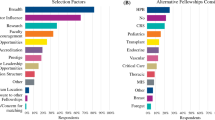Abstract
Background
Surgical oncologists (SO) and hepatobiliary (HPB) surgeons frequently care for patients with advanced diseases near the end of life, yet little is known about their training, comfort, and readiness in the provision of palliative care. This study sought to assess the quality, adequacy, and extent of palliative care training and the readiness of SO and HPB fellows in delivering palliative care.
Methods
A self-administered survey was distributed to all fellows enrolled in Society of Surgical Oncology (SSO) and HPB fellowships during the 2013–2014 academic year. The survey assessed attitudes, training, experience, and readiness of fellows in caring for patients at the end of life. Descriptive analysis was performed, and Chi square, Student’s t test, and the Mann–Whitney U test were used to compare mean or median values as appropriate.
Results
The response rate was 47.2 %, and 50.9 % of the fellows reported exposure to a palliative care specialty service during their fellowship. Of the study participants, 75 % observed their faculty discussing the side effects of surgery compared with 54 % who observed faculty communication with patients regarding end-of-life goals (p < 0.01). On the other hand, 40 % of the fellows were never observed by faculty discussing symptoms management, goals of care, or hospice referral with patients, and 56.7 % never received feedback on their palliative skills.
Conclusion
The fellows rated the quality of their palliative care education as poor compared with other aspects of their fellowship training, implying the lack and need of palliative care teaching. Surgical oncology and HPB fellows and ultimately patients may benefit from increased clinical and didactic palliative care training.

Similar content being viewed by others
References
Smith BD, Smith GL, Hurria A, Hortobagyi GN, Buchholz TA. Future of cancer incidence in the United States: burdens upon an aging, changing nation. J Clin Oncol. 2009;27:2758–65.
Siegel R, Naishadham D, Jemal A. Cancer statistics, 2012. CA Cancer J Clin. 2012;62:10–29.
Jemal A, Siegel R, Xu J, Ward E. Cancer statistics, 2010. CA Cancer J Clin. 2010;60:277–300.
Lunney JR, Lynn J, Foley DJ, Lipson S, Guralnik JM. Patterns of functional decline at the end of life. JAMA. 2003;289:2387–92.
WHO Definition of Palliative Care. 2014. At http://www.who.int/cancer/palliative/definition/en/. Accessed 20 Feb 2014.
Bakitas M, Lyons KD, Hegel MT, et al. Effects of a palliative care intervention on clinical outcomes in patients with advanced cancer: the Project ENABLE II randomized controlled trial. JAMA. 2009;302:741–9.
Temel JS, Greer JA, Muzikansky A, et al. Early palliative care for patients with metastatic non-small-cell lung cancer. N Engl J Med. 2010;363:733–42.
Dunn GP, Martensen R, Weissman D. Surgical palliative care: a resident’s guide. Essex, CT: American College of Surgeons, 2009.
Weissman DE, Block SD. ACGME requirements for end-of-life training in selected residency and fellowship programs: a status report. Acad Med. 2002;77:299–304.
Americas Hepato-Pancreato-Billiary Association (AHPBA). AHPBA Curriculum. www.AHBPA.org. Accessed 02 Nov 2013.
Buss MK, Lessen DS, Sullivan AM, Von Roenn J, Arnold RM, Block SD. A study of oncology fellows’ training in end-of-life care. J Support Oncol. 2007;5:237–42.
Sullivan AM, Lakoma MD, Block SD. The status of medical education in end-of-life care: a national report. J Gen Intern Med. 2003;18:685–95.
Survey Monkey. 2014. At http://www.surverymonkey.com. Accessed 01 Dec 2013.
Buchman TG, Cassell J, Ray SE, Wax ML. Who should manage the dying patient? Rescue, shame, and the surgical ICU dilemma. J Am Coll Surg. 2002;194:665–73.
Cassell J, Buchman TG, Streat S, Stewart RM, Buchman TG. Surgeons, intensivists, and the covenant of care: administrative models and values affecting care at the end of life. Crit Care Med. 2003;31:1263–70.
Schwarze ML, Bradley CT, Brasel KJ. Surgical “buy-in”: the contractual relationship between surgeons and patients that influences decisions regarding life-supporting therapy. Crit Care Med. 2010;38:843–8.
Holley JL, Carmody SS, Moss AH, et al. The need for end-of-life care training in nephrology: national survey results of nephrology fellows. Am J Kidney Dis. 2003;42:813–20.
Lesnock JL, Arnold RM, Meyn LA, et al. Palliative care education in gynecologic oncology: a survey of the fellows. Gynecol Oncol. 2013;130:431–5.
Pan CX, Carmody S, Leipzig RM, et al. There is hope for the future: national survey results reveal that geriatric medicine fellows are well-educated in end-of-life care. J Am Geriatr Soc. 2005;53:705–10.
Bradley EH, Cramer LD, Bogardus ST Jr, Kasl SV, Johnson-Hurzeler R, Horwitz SM. Physicians’ ratings of their knowledge, attitudes, and end-of-life-care practices. Acad Med. 2002;77:305–11.
Weissman DE, Ambuel B, von Gunten CF, et al. Outcomes from a national multispecialty palliative care curriculum development project. J Palliat Med. 2007;10:408–19.
von Gunten CF. Interventions to manage symptoms at the end of life. J Palliat Med. 2005;8(Suppl 1):S88–94.
Weissman DE, Quill TE, Block SD. Missed opportunities in medical student education. J Palliat Med. 2010;13:489–90.
Schaefer KG, Chittenden EH, Sullivan AM, et al. Raising the bar for the care of seriously ill patients: results of a national survey to define essential palliative care competencies for medical students and residents. Acad Med. 2014;89:1024–31.
Davis DA, Mazmanian PE, Fordis M, Van Harrison R, Thorpe KE, Perrier L. Accuracy of physician self-assessment compared with observed measures of competence: a systematic review. JAMA. 2006;296:1094–102.
Hodges B, Regehr G, Martin D. Difficulties in recognizing one’s own incompetence: novice physicians who are unskilled and unaware of it. Acad Med. 2001;76:S87–9.
Cummings SM, Savitz LA, Konrad TR. Reported response rates to mailed physician questionnaires. Health Serv Res. 2001;35:1347–55.
Nulty DD. The adequacy of response rates to online and paper surveys: what can be done? Assess Eval Higher Ed. 2008;33:301–14.
Quill TE, Abernethy AP. Generalist plus specialist palliative care: creating a more sustainable model. N Engl J Med. 2013;368:1173–5.
Acknowledgment
The authors acknowledge the Foundation of Surgical Fellowships for its support.
Disclosure
No relevant financial disclosures.
Author information
Authors and Affiliations
Corresponding author
Rights and permissions
About this article
Cite this article
Amini, A., Miura, J.T., Larrieux, G. et al. Palliative Care Training in Surgical Oncology and Hepatobiliary Fellowships: A National Survey of the Fellows. Ann Surg Oncol 22, 1761–1767 (2015). https://doi.org/10.1245/s10434-014-4226-0
Received:
Published:
Issue Date:
DOI: https://doi.org/10.1245/s10434-014-4226-0




